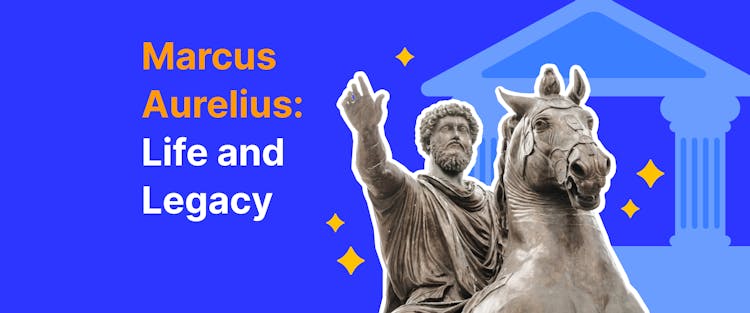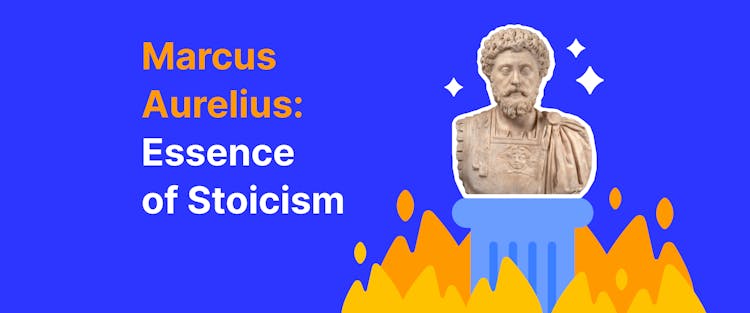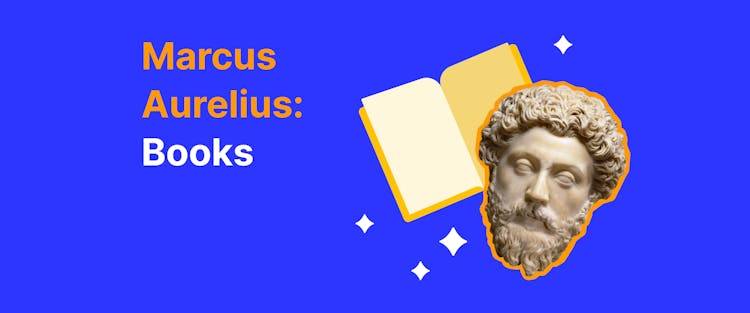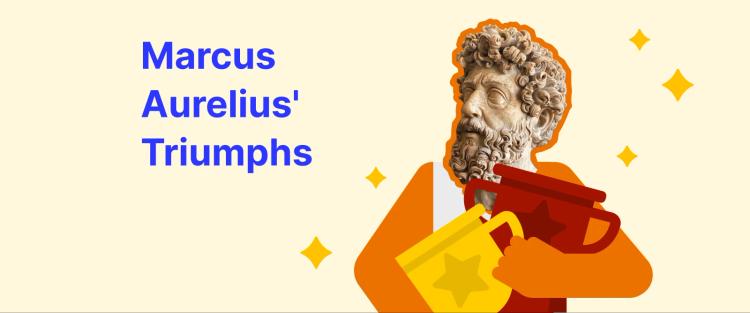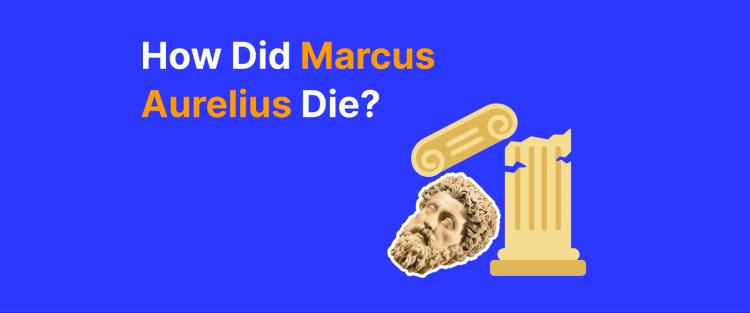In the tapestry of history, few figures shine as brightly as Marcus Aurelius, the esteemed Roman Emperor of 161 AD. Renowned as the epitome of imperial virtue, Aurelius' wisdom and integrity inspire centuries after his reign. Beyond his imperial duties, he was a philosopher-king, embracing Stoic principles of virtue and self-mastery. Even today, his timeless quotations from "Meditations" and beyond are a roadmap to a life of wisdom and moral rectitude. Join us as we explore the profound insights of Marcus Aurelius, uncovering the essence of his philosophy and the motivations of a leader whose legacy remains a beacon of guidance in our modern world.
Best Marcus Aurelius quotes
According to the Stoic philosophy championed by Marcus Aurelius, a Stoic life choice is to agree with yourself. This is the highest value that a person can possess. Internal harmony, coherence of the whole and its parts, and unity with the entire world are ideal for a Stoic philosophy. His quotes often reflect this principle, especially in his diary, which we know today as "Meditations." But before we dive into his quotes, let’s see what shaped Marcus Aurelius to believe in what he believed.
Prerequisites of Aurelius’ philosophy
"Meditations" is a working notebook of the philosopher emperor's mental workshop. In it, he wrote down problems that arose before him and gave solutions based on his philosophy. Interestingly, Marcus Aurelius was an orphan adopted and raised by Emperor Antonius Pius. Marcus got an excellent education from the best teachers of that time, and studying philosophy influenced his life and rule.
At 12, Marcus put on a philosophical robe, learned to sleep on a hard surface, and fulfilled all the strict requirements of the asceticism of the Stoics. He had spent half of his reign in fierce wars, defending the borders of the Roman Empire. While the war was a significant factor in pushing many rulers down the path of tyranny, Aurelius often reminded himself to maintain humility and morality through his collection of thoughts.
The emperor-philosopher had one wife and was faithful to her. They even sometimes were in military camps together. They had 13 children, but unfortunately, 7 of them died in early childhood. The life of Marcus Aurelius was full of stress and anxiety, but he knew how he needed to react to the circumstances. Marcus talked about the reason for the loss of peace: people say and do many unnecessary things. According to Aurelis, the direction of our thoughts determines our choices in life and our relationship to people and things.
"The soul becomes dyed with the color of its thoughts."

"The happiness of your life depends upon the quality of your thoughts."

Stoicism
"Waste no more time arguing what a good man should be. Be one."
 Why do people feel unhappy? Marcus Aurelius saw that people constantly desired what was beyond their means. The only thing in our power that cannot be taken away from us is the will to act according to reason.
Why do people feel unhappy? Marcus Aurelius saw that people constantly desired what was beyond their means. The only thing in our power that cannot be taken away from us is the will to act according to reason.
"The art of living is more like wrestling than dancing because an artful life requires being prepared to meet and withstand sudden and unexpected attacks."
 The will to do good is that impregnable inner fortress everyone can build in themselves. Only here can a person find freedom, independence, and dignity, which the Stoics valued to the highest degree - understanding with oneself.
The will to do good is that impregnable inner fortress everyone can build in themselves. Only here can a person find freedom, independence, and dignity, which the Stoics valued to the highest degree - understanding with oneself.
"I have often wondered how it is that every man loves himself more than all the rest of men, but yet sets less value on his own opinion of himself than on the opinion of others."

Inner peace
The thought of imminent death makes one consider the infinite value of every moment. This is a call to action to live each day as if it were the last of one's life.
"Remember that man lives only in the present, in this fleeting instant; all the rest of his life is either past and gone, or not yet revealed. Short, therefore, is man's life, and narrow is the corner of the earth wherein he dwells."

"All you need are these: certainty of judgment in the present moment: action for the common good in the present moment; and an attitude of gratitude in the present moment for anything that comes your way."
 In addition, a person should be constantly attentive to the world and himself. Marcus Aurelius' "Meditations" was a model of the spiritual work of a Stoic who delves into the world, joyfully aware of himself as a part of the tremendous global whole.
In addition, a person should be constantly attentive to the world and himself. Marcus Aurelius' "Meditations" was a model of the spiritual work of a Stoic who delves into the world, joyfully aware of himself as a part of the tremendous global whole.
"Nowhere you can go is more peaceful—more free of interruptions—than your own soul." (Hays translation)
 Society constitutes the whole of which man is a part. A person has to accept their place and fulfill the task society assigns them. In its fulfillment lies good because what is good for society is also suitable for a person, even though it might sometimes be unpleasant.
Society constitutes the whole of which man is a part. A person has to accept their place and fulfill the task society assigns them. In its fulfillment lies good because what is good for society is also suitable for a person, even though it might sometimes be unpleasant.
Love and human connections
Living in harmony and friendship with others is probably part of what the Stoics meant by "living according to nature." Marcus Aurelius presented this teaching in his life, considering his ruling, justice attitude to people, respect of the Senate, and even restrained reaction to Cassius’ rebellion.
"Not to display anger or other emotions. To be free of passion and yet full of love." (Hays translation)
 A cardinal virtue directly related to our interactions with other people is "justice." For the Stoics, justice is a form of social and moral wisdom. It consists of two main elements:
A cardinal virtue directly related to our interactions with other people is "justice." For the Stoics, justice is a form of social and moral wisdom. It consists of two main elements:
Kindness or benevolence towards other people.
Fair and impartial treatment of others.
"To live each day as though one's last, never flustered, never apathetic, never attitudinizing – here is perfection of character."

Ten Marcus Aurelius’ strategies in communicating with people
Marcus Aurelius crafted a list of invaluable principles, a guide for navigating encounters with challenging people. According to Stoic teaching and Marcus' diary, these tenets include kindness, justice, and a deep-seated affection rooted in nature.
1. By nature, we are social creatures meant to help each other. Marcus even argues that neglecting one’s relationships with others is a form of injustice, vice, and disrespect because it is against Nature.
"Men exist for the sake of one another. Teach them then or bear with them." (Long translation)
 2. Understanding people, even if they are not kind.
2. Understanding people, even if they are not kind.
"It is crazy to want what is impossible. And impossible for the wicked not to do so." (Hays translation)
 3. People are not guilty that they are sinful.
3. People are not guilty that they are sinful.
"Every soul, the philosopher says, is involuntarily deprived of truth; consequently in the same way it is deprived of justice and temperance and benevolence and everything of the kind. It is most necessary to keep this in mind, for thus thou wilt be more gentle towards all."
 4. No one is perfect, including you.
4. No one is perfect, including you.
"The rottenness of the matter which is the foundation of everything!"
 5. You never know the true motives of other people.
5. You never know the true motives of other people.
"In a sense, people are our proper occupation. Our job is to do them good and put up with them. But when they obstruct our proper tasks, they become irrelevant to us--like sun, wind, and animals. Our actions may be impeded by them, but there can be no impeding our intentions or our dispositions. Because we can accommodate and adapt. The mind adapts and converts to its own purposes the obstacle to our acting. The impediment to action advances action. What stands in the way becomes the way." (Hays translation)
 6. Remember that we are all mortal.
6. Remember that we are all mortal.
"Be straightforward. Look at things like a man, like a human being, like a citizen, like a mortal." (Hays translation)
 7. We are upset by our own judgments.
7. We are upset by our own judgments.
"Choose not to be harmed—and you won't feel harmed. Don't feel harmed—and you haven't been." (Hays translation)
 8. Anger does more harm than good.
8. Anger does more harm than good.
"How much more damage anger and grief do than the things that cause them." (Hays translation)
 9. Nature endows us with virtues that help us deal with anger
9. Nature endows us with virtues that help us deal with anger
"As the nature of the universal has given to every rational being all the powers that it has, so we have received from it this power also. For as the universal nature converts and fixes in its predestined place everything which stands in the way and opposes it, and makes such things a part of itself, so also the rational animal is able to make every hindrance its own material, and to use it for such purpose as it may have designed."
 10. Expect others to be perfect - madness
10. Expect others to be perfect - madness
"Yes, boorish people do boorish things. What's strange or unheard-of about that? Isn't it yourself you should reproach—for not anticipating that they'd act this way?" (Hays translation)
 In the first chapter of "Meditations" Marcus Aurelius' affection for those who shared his life with him and helped him understand what qualities are precious in human life is powerfully conveyed. Thoughtful and affectionate concern for others is prominent among the qualities he singles out in the people he remembers in this way.
In the first chapter of "Meditations" Marcus Aurelius' affection for those who shared his life with him and helped him understand what qualities are precious in human life is powerfully conveyed. Thoughtful and affectionate concern for others is prominent among the qualities he singles out in the people he remembers in this way.
"From my grandfather Verus, I have learned to be gentle and meek and to refrain from all anger and passion. I have learned both shamefastness and manlike behaviour. From my mother, I have learned to be religious and bountiful and to forbear, not only to do but to intend any evil; to content myself with a spare diet and to fly all such excess as is incidental to great wealth."

Overcoming adversity with resilience
According to Marcus Aurelius, courage means being ready to face difficulties and not being afraid to take active measures. It is the courage to stick to one's beliefs even when others shy away. It is the courage to accept past trials without regret and look to the future without fear.
"You have power over your mind – not outside events. Realize this, and you will find strength."
 For Stoics, any trouble, even the most difficult, is a chance to become stronger. There is no calamity; there are trials, and courage tells them to go through them no matter what. Of course, a Stoic will not strive for useless trials but will accept them with courage.
For Stoics, any trouble, even the most difficult, is a chance to become stronger. There is no calamity; there are trials, and courage tells them to go through them no matter what. Of course, a Stoic will not strive for useless trials but will accept them with courage.
"The first rule is to keep an untroubled spirit. The second is to look things in the face and know them for what they are."
 We learn about how deeply Marcus Aurelius was immersed in Stoicism and how it helped him sustain himself in military campaigns from his philosophical diary:
We learn about how deeply Marcus Aurelius was immersed in Stoicism and how it helped him sustain himself in military campaigns from his philosophical diary:
"The best revenge is not to be like your enemy."
 Such a high demand, set for himself, gave the emperor endurance to bear the burden of the duties he had assumed.
Such a high demand, set for himself, gave the emperor endurance to bear the burden of the duties he had assumed.
Virtue
From the diary of emperor Marcus Aurelius, we note that Stoics treat others gently, desiring them to become wise and virtuous. However, we must do this while recognizing that other people's behavior is beyond our control. Therefore, Stoic love and friendship do not require reciprocity. A Stoic is kind and gentle because it is a virtue, not because they hope to gain anything by being kind to others. Indeed, the ability to treat others with friendship, even if they do not reciprocate, is something we usually praise and admire in different people.
"The best revenge is not to be like your enemy."
 Stoicism is a practical philosophy in which virtue is seen as the highest human good since it alone leads to "eudaimonia" (a dignified, happy life). The practical realization of virtues occurs through the Stoic's active participation in social life and conscientious performance of his duties.
Stoicism is a practical philosophy in which virtue is seen as the highest human good since it alone leads to "eudaimonia" (a dignified, happy life). The practical realization of virtues occurs through the Stoic's active participation in social life and conscientious performance of his duties.
"But true good fortune is what you make for yourself. Good fortune: good character, good intentions, and good actions." (Hays translation)
 Moderation should be observed in everything. Marcus Aurelius believed people had to maintain internal harmony and balance, avoiding excessive extremes in their aspirations and desires. Any banal pleasures can turn into suffering and bring more grief than joy.
Moderation should be observed in everything. Marcus Aurelius believed people had to maintain internal harmony and balance, avoiding excessive extremes in their aspirations and desires. Any banal pleasures can turn into suffering and bring more grief than joy.
Lessons and Stoic quotes for every day
Improving one's personality is vital. Self-discipline comes first, but justice gives higher purposes in harmony with nature. First come the individual, neighbors, society, country, and the world. Marcus Aurelius was not only intelligent but also incredibly active. He believed every minute is precious and taught us to value time as the most precious and irreplaceable resource.
"Each of us lives only now, this brief instant." (Hays translation)

Challenge yourself
Setting challenges and goals that require courage can help you develop this quality. Try to go beyond your comfort zone and take on new challenges.
"At dawn, when you have trouble getting out of bed, tell yourself: ‘I have to go to work – as a human being. What do I have to complain of, if I’m going to do what I was born for – the things I was brought into the world to do? Or is this what I was created for? To huddle under the blankets and stay warm?" (Hays translation)

Learn to make decisions
Courage is associated with making decisions, even in difficult situations. Learn to set a goal, take responsibility, and act decisively. Marcus Aurelius wrote about purposefulness and ambitions:
"A man's worth is no greater than the worth of his ambitions."
 Look for learning in life situations: every day and every situation can be a teacher. Practice courage in your everyday life.
Look for learning in life situations: every day and every situation can be a teacher. Practice courage in your everyday life.
"Not to live as if you had endless years ahead of you. Death overshadows you. While you’re alive and able — be good."

Moderation
Moderation means achieving balance in various aspects of life. A person should try not to be overwhelmed by responsibilities and ensure physical, emotional, and spiritual harmony. Such harmony leads to improved results in life and enhances personality. How philosopher-king Aurelius wrote about this:
"[Before making a decision] The first thing to do – don't get worked up. For everything happens according to the nature of all things, and in a short time you'll be nobody and nowhere even as the great emperors Hadrian and Augustus are now. The next thing to do – consider carefully the task at hand for what it is, while remembering that your purpose is to be a good human being. Get straight to doing what nature requires of you, and speak as you see most just and fitting – with kindness, modesty, and sincerity."
 Moderation is about finding the middle ground. This is important but only one of the four Stoic virtues. A synergy of all virtues is essential. In today's world, moderation can be practiced daily: social media, TV shows, temptations, etc. When one of these things is caused by a foolish desire, and you know it will be harmful, but you do it anyway, you give in to one of the passions.
Moderation is about finding the middle ground. This is important but only one of the four Stoic virtues. A synergy of all virtues is essential. In today's world, moderation can be practiced daily: social media, TV shows, temptations, etc. When one of these things is caused by a foolish desire, and you know it will be harmful, but you do it anyway, you give in to one of the passions.
Virtuous path
Don't forget the four Stoic virtues —courage, moderation, justice, and wisdom. All of them are important, and it is impossible to neglect any of them in the pursuit of a virtuous life. Learn how to implement each at the right time, and you will take steps forward. When in doubt about what to do, choose the options that most align with the virtuous path. This is how you can live successfully and happily.
"To live your brief life rightly, isn't that enough?" (Hays translation)
 According to Marcus Aurelius, wisdom is a dynamic process, a constant path of discovery and growth. Improving the mind enhances our ability to make the right decisions. It cultivates a sense that, without fear of the future, sees every difficulty as an opportunity for development and growth. Wisdom is not the accumulation of knowledge but its integration into life. It transforms into insightful understanding that illuminates our path. It allows us to live with purpose, clarity, and deep satisfaction. Stoic philosopher and at the same time, the head of a large state, Marcus Aurelius wrote in his "Meditations":
According to Marcus Aurelius, wisdom is a dynamic process, a constant path of discovery and growth. Improving the mind enhances our ability to make the right decisions. It cultivates a sense that, without fear of the future, sees every difficulty as an opportunity for development and growth. Wisdom is not the accumulation of knowledge but its integration into life. It transforms into insightful understanding that illuminates our path. It allows us to live with purpose, clarity, and deep satisfaction. Stoic philosopher and at the same time, the head of a large state, Marcus Aurelius wrote in his "Meditations":
"The object of life is not to be on the side of the majority, but to escape finding oneself in the ranks of the insane."

Explore "Meditations" with Headway app
You can't grasp universal recipes for success, but you can get support from those facing challenging situations. The times of Marcus Aurelius were complex: the state was crowded by barbarians from the outside, it was morally decaying from the inside - and the time of his reign was later called golden. His diaries, "Meditations," which he mainly kept in military tents, were full of thoughts: if there is such a mess around, how can one remain "noble" and maintain peace of mind? If you desire to delve into your inner world and continue to explore a wisdom of Marcus Aurelius, read or listen a summary of "Meditations" in the Headway app.
Frequently Asked Questions
What does "what stands in the way becomes the way" by Marcus Aurelius mean?
"The mind adapts and converts to its purposes the obstacle to our acting. The impediment to action advances action. What stands in the way becomes the way." This is a quote from Marcus Aurelius’ Meditations, Book V.20, translated by Gregory Hays.


